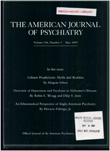Forty-year follow-up of United States prisoners of war
Abstract
The authors performed structured psychiatric examinations of 188 former prisoners of war (POWs). Sixty-seven percent had had posttraumatic stress disorder. Of those affected, 29% had fully recovered, 39% still reported mild symptoms, 24% had improved but had moderate residual symptoms, and 8% had had no recovery or had deteriorated. Presence of posttraumatic stress disorder was not significantly correlated with other mental disorders. Delayed onset was not seen. The findings confirm the DSM-III concept of and criteria for posttraumatic stress disorder.
Access content
To read the fulltext, please use one of the options below to sign in or purchase access.- Personal login
- Institutional Login
- Sign in via OpenAthens
- Register for access
-
Please login/register if you wish to pair your device and check access availability.
Not a subscriber?
PsychiatryOnline subscription options offer access to the DSM-5 library, books, journals, CME, and patient resources. This all-in-one virtual library provides psychiatrists and mental health professionals with key resources for diagnosis, treatment, research, and professional development.
Need more help? PsychiatryOnline Customer Service may be reached by emailing [email protected] or by calling 800-368-5777 (in the U.S.) or 703-907-7322 (outside the U.S.).



